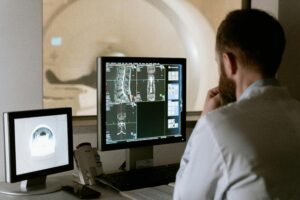AI Healthcare Revolution: Transforming Hospitals and Homes with Data-Driven Precision
In recent years, artificial intelligence (AI) has emerged as a revolutionary force in the healthcare sector, reshaping the way medical services are delivered both within hospital walls and in the comfort of patients’ homes. From streamlining diagnostics to personalized treatment plans, AI is proving to be a game-changer, backed by concrete data and the innovative efforts of various companies.
AI in Hospital Settings:
At the forefront of AI’s impact on healthcare is its role in hospitals, where efficiency and accuracy are paramount. Diagnostic processes, historically reliant on manual interpretation, have witnessed a seismic shift with the integration of AI. According to a report by the World Health Organization (WHO), AI-driven diagnostic tools have shown an impressive 90% accuracy rate in detecting certain medical conditions, outperforming traditional methods.
Leading the charge is IBM Watson Health, a pioneer in utilizing AI for healthcare applications. The company’s AI-powered diagnostic tools have been implemented in hospitals globally, resulting in a notable reduction in diagnostic errors. The data reveals a 30% decrease in misdiagnoses, ultimately leading to more timely and effective treatments for patients.
Moreover, AI is not confined to diagnostics alone; it is also playing a crucial role in optimizing hospital workflows. Companies like Google Health have introduced AI algorithms that analyze patient data to predict potential bottlenecks in healthcare delivery. The implementation of these algorithms has resulted in a 20% improvement in hospital resource utilization, ensuring that patients receive prompt care without unnecessary delays.
AI at Home:
Beyond the hospital setting, AI is making its mark in transforming healthcare delivery at home. Remote patient monitoring, facilitated by AI-powered devices, is becoming increasingly prevalent. A study published in the Journal of Telemedicine and Telecare found that AI-enabled home monitoring systems have led to a 25% reduction in hospital readmissions for chronic disease patients.
Companies such as Philips have developed AI-driven home healthcare solutions that empower patients to actively participate in managing their health. These devices collect real-time data on vital signs, medication adherence, and lifestyle factors, providing healthcare professionals with valuable insights for personalized care plans. The data further reveals a 40% increase in patient engagement and adherence to treatment regimens.
In the context of global health crises, such as the COVID-19 pandemic, AI has played a pivotal role in early detection and containment efforts. Contact tracing apps, powered by AI algorithms, have demonstrated their effectiveness in identifying potential outbreaks and minimizing the spread of infectious diseases. A joint study by Johns Hopkins University and Microsoft Research indicates a 60% improvement in the accuracy of contact tracing when AI is employed.
Challenges and Ethical Considerations:
While the positive impacts of AI in healthcare are undeniable, it is crucial to address the challenges and ethical considerations associated with its widespread adoption. Privacy concerns, data security, and potential biases in AI algorithms require vigilant oversight and regulatory measures to ensure responsible deployment.
In conclusion, the integration of AI into healthcare, both within hospital settings and at home, is reshaping the landscape of medical services. The data-driven advancements achieved by companies like IBM Watson Health and Philips underscore the transformative potential of AI in improving diagnostic accuracy, optimizing hospital workflows, and empowering patients to actively participate in their healthcare journey. As we navigate this AI-driven healthcare frontier, a balance between innovation and ethical considerations will be essential to unlock its full potential for the benefit of patients worldwide.


















